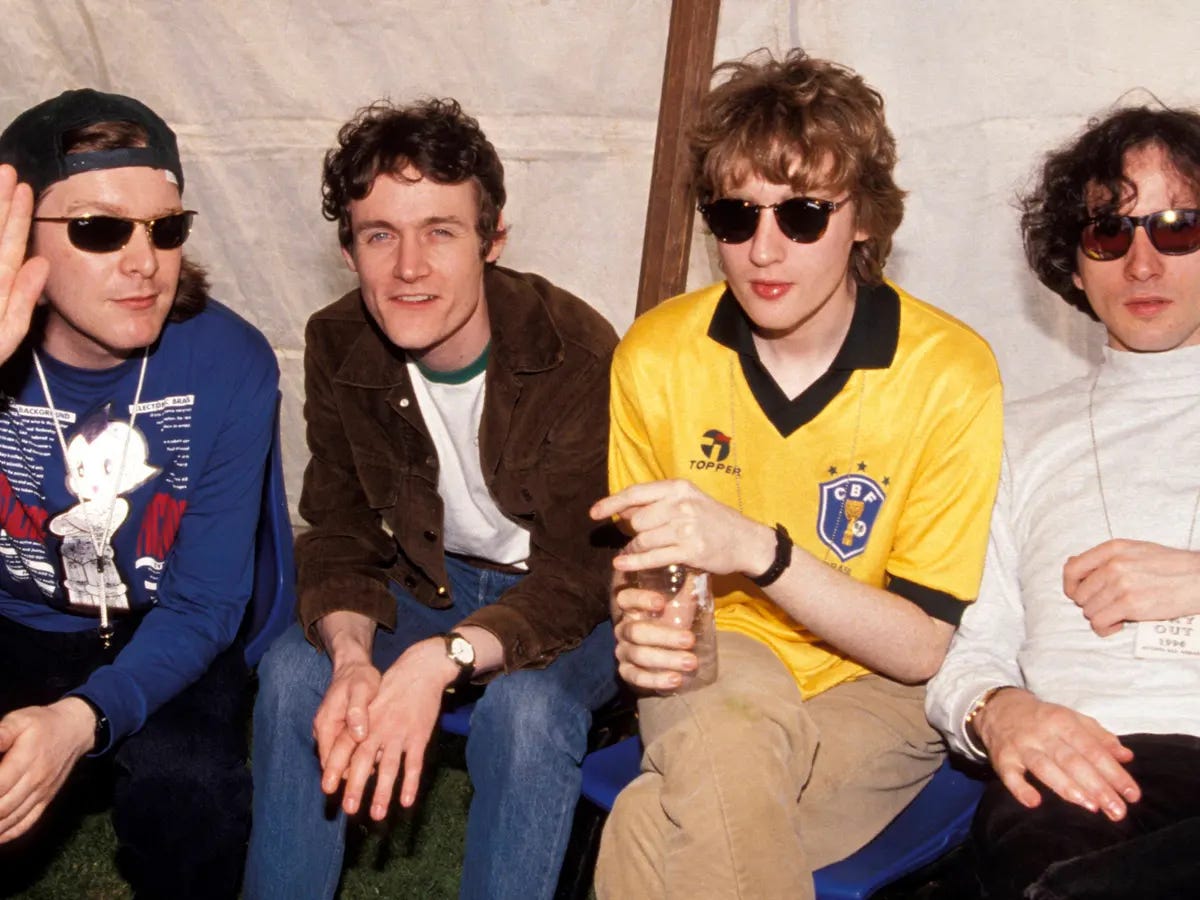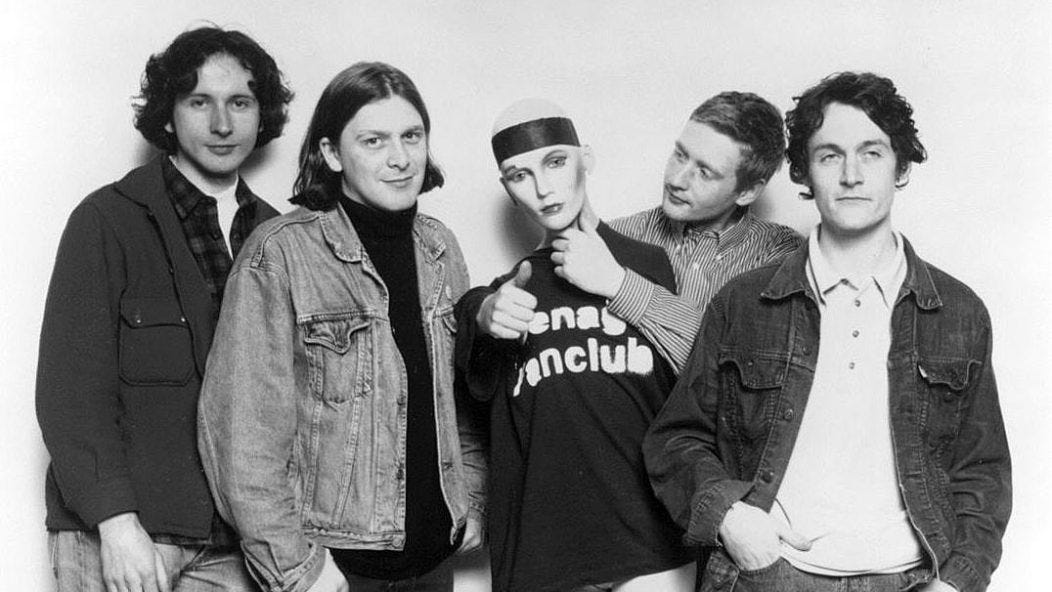Writing well about music is hard, and one reason, I think, is curiously circular: Most music writing is garbage, and its sins of imprecision, woolly-headed enthusiasm, and compulsive cliché-spewing are so ubiquitous, so entrenched, that before offering my own, I have to perform the mental equivalent of a hard shower in order to scrub myself clean of the bad habits that I fear might have stuck to me like last night’s cigarette smoke.
Before writing this, I read several articles about Teenage Fanclub, including profiles. One was this article from 2016, formed by interviews with three members of the band. It is, as a journalist might say, “ropey” – that is, an artless regurgitation of quotes, lazily strung together. There’s no thinking or writing here – words are merely putty with which to gruesomely adhere slabs of the interview.
What’s curious is that the writer, an experienced music journalist, is such a great fan of the group. In her intro, Rogers describes how the band soundtracked so many splendid or pivotal moments of her life. The Fannies, she confesses, electrified her – and yet her writing is depressingly lifeless.
Now, I don’t know Jude Rogers and know nothing about the circumstances in which she wrote her piece. Journalistic deadlines are unforgiving, and it can force bad work from good people. God knows I’ve written a few ropey pieces myself – though rarely about a subject that interests me. (Judging by Rogers’ recent profile of Blur’s Dave Rowntree, though, I suspect the fault lies principally with the writer. Amongst other banalities, there’s a pedantic gathering of facts – year of birth; the occupations of the parents – to suggest the writer’s insight and labour, but which appear on the page like a sparrow’s dull collection of twigs.)
These witless “profiles” are prolific, and it seems obvious that even the most experienced hacks struggle to write well about even the musicians who have personally inspired them. On the evidence of my reading, it would seem that the weird fires lit by certain music are inexpressible to most – and that simply admiring music (or admiring your own taste) is insufficient ground for writing well about it.
This should be profoundly humbling for the average music writer, including myself: that our own passion cannot generate work of much value or interest. That the music’s magic is not contagious; that is has not, and will not, inspire our own.
It might also be said that musicians aren’t always articulate, or enthusiastic, explainers of their work or lives. There are myriad reasons for this, of course. That their gifts are reserved for one form of expression, and not another; that the press circuit is numbingly repetitive, and encourages bored acquiescence rather than generosity; that rapport with a journalist is hard to establish in the short period of time you (typically) have. Or, simply, that they’re contemptuous of music writers.
In other words, and for various reasons, you can have dud interviews. But for me, this still doesn’t account for the expansive, sky-covering clouds of shit music writing.
I began this piece thinking I would write about Teenage Fanclub. Instead, I’m writing about writing about Teenage Fanclub. I got to thinking about how, when writing about this band, one seems obliged to mention several things: That Cobain liked them; that SPIN rated Bandwagonesque above Nevermind and Loveless in ‘91. That they never achieved the recognition they deserved, but they kept going. That they were young once; and now they’re not.
Yes, yes, yes. We fucking know. I don’t understand what pleasure can be had in rehashing, for the thousandth time, such trivia and received wisdoms; nor what pleasure the writer expects the reader might find in encountering them yet again. But for the unimaginative hack, trivia and cliches are professional lifeboats.
The writer’s excitement for the music seems hopelessly, depressingly lost in translation. As I wrote here, the gulf between the writer and the music was central to the wild, often unreadable excesses of early rock criticism. And if I’m scornful of much of the work, I can at least salute the attempt. And in the case of Lester Bangs, he did manage to write some enduring things – essays every bit as alive and lasting as the music he’s writing about.
Ideally, the writer should be finding interesting things in their subjects, helping to illuminate their work or their lives, and above all, doing so in a way that offers pleasure to the reader. Or at least applying a skill and imagination that might approach that of the music. But that’s hard to achieve – easier to rope together quotes with strings of gummy adjectives.
Can I give you an example? In Rogers’ profile of Teenage Fanclub, she gets this fascinating quote from Norman Blake on ageing: “You experience death more, and illness,” he said. “And you just don’t do things you did when you were a young rock ‘n’ roller… I guess not if you’re Mick Jagger, though. He’s having a baby, isn’t he? Bloody hell. I guess because the Stones were famous at 20, they’re still acting like they’re 20. We were never famous, so we’re still getting old.”
It’s “just” banter, and thus tossed unthinkingly into the article’s word salad like a slice of tomato. But there, right there, is the whole piece if I was writing it: Teenage Fanclub and ageing – and the inescapable fact that these once care-free harmony gods have become increasingly, predictably, but forgivingly boring.
Music can rewire us, colour our brains, place strange tastes upon our tongues. It can gloriously, or cruelly, remind us of our aliveness. It can electrify optimism; it can ratify misery. It can do all sorts of weird and powerful and private things, just as it can do big and strange and public things. And these things are often achieved by fascinatingly unusual people.
And so it’s a shame that so much of our writing about it is narcotising. Most of it shouldn’t exist – or, perhaps it’s better to say that nothing would much change if it didn’t.





